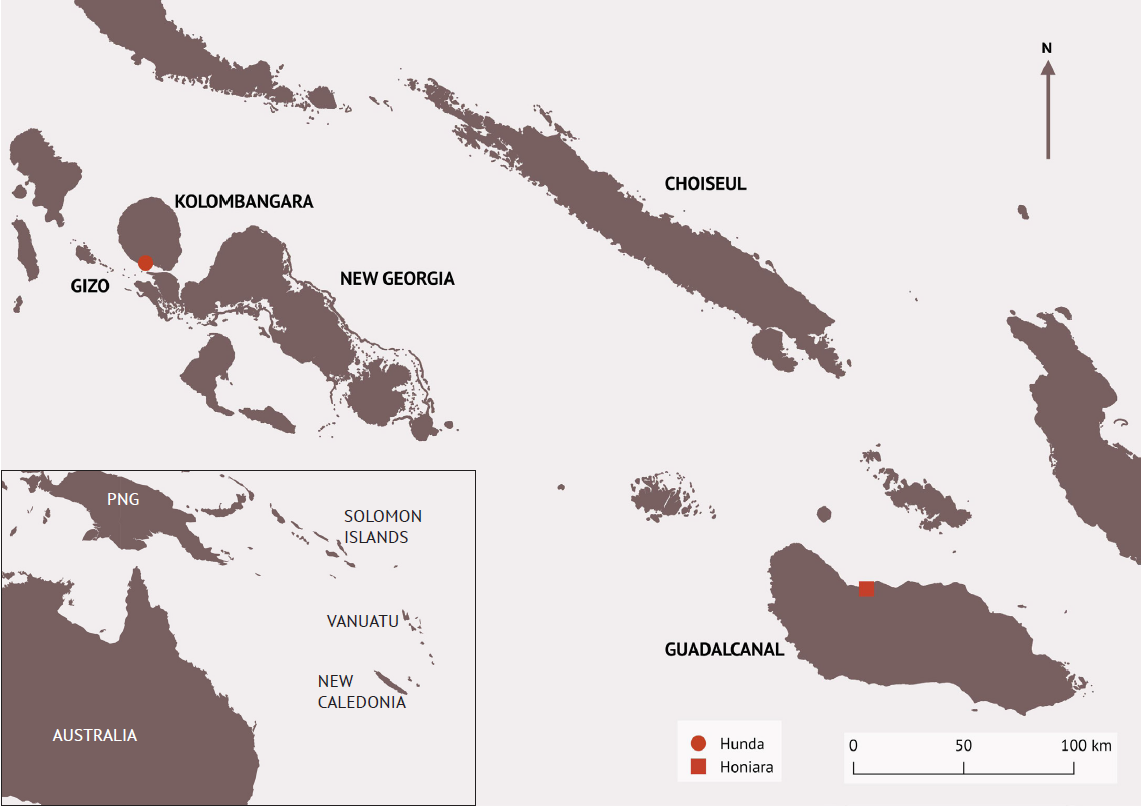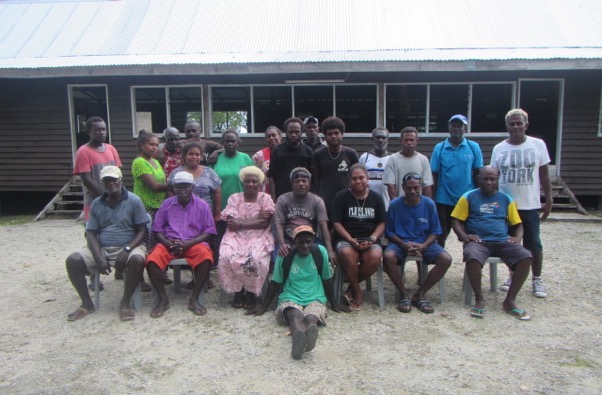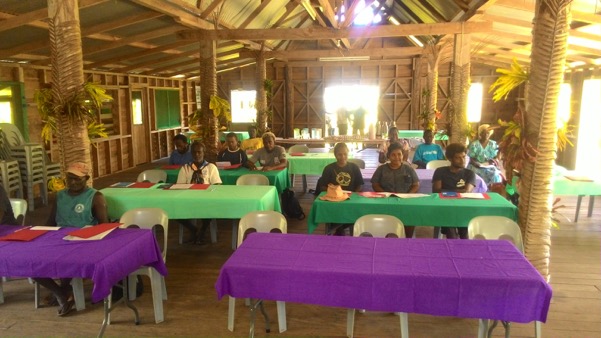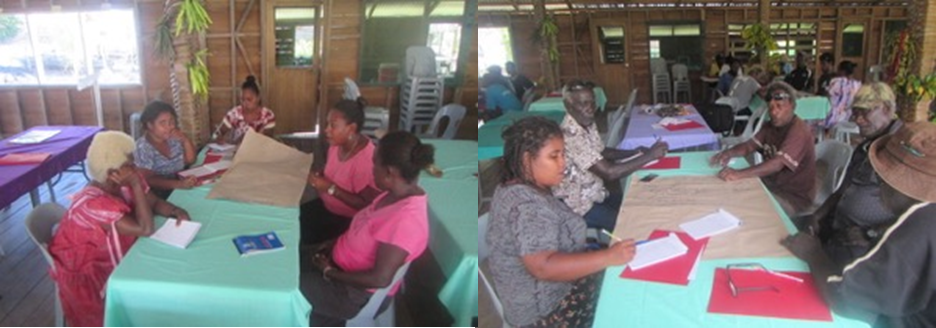Voices from the Sylff Community
Jun 7, 2018
Catalyzing Cultural Revitalization in Western Province, Solomon Islands
Joe McCarter
Indigenous knowledge and practice are critical on Kolombangara Island, but they are often not visible in discussions of conservation and resource management. In response, Sylff fellow Joe McCarter and the Kolombangara Island Biodiversity Conservation Association (KIBCA) initiated a workshop to discuss cultural revitalization, as well as teach practical documentation skills to rangers and community members. The workshop was held in Hunda, a village on Kolombangara Island in the Solomon Islands’ Western Province, and was led by representatives of the Vanuatu Cultural Center (VCC). The VCC team included three fieldworkers (ni-Vanuatu researchers) and the head of the Vanuatu Women’s Culture Program. The workshop covered a variety of topics, including the challenges and ethics of cultural maintenance, techniques and best practice, and the importance of such activities. On the final day, the group came up with several action points and next steps, including community and home-based recording and maintenance and agreed to create a new network focused on Kolombangara Island and run through KIBCA.
***
Project Background
Indigenous knowledge and practice are important components of everyday life in the Solomon Islands. Most people live in rural areas, and gardening, fishing, and food gathering are the basis of income and nutrition. Most land is managed under customary tenure, and people’s links to the land can be traced back several generations. Local languages and cultures are important and diverse, and cultural practices guide interactions and governance over much of the country.
On Kolombangara Island, a high volcanic island in Western Province, local knowledge and practice play a key role. Over 6,000 people live on the island, largely in small rural communities on land that is managed under customary tenure. Kolombangara is a biodiversity hotspot, and KIBCA has been working since 2008 to coordinate and promote biodiversity conservation activities around the island. However, there has been little attention to the maintenance of language and kastom (a Solomon Island Pijin concept referring to history and tradition), and KIBCA has been seeking to increase its focus on maintenance and revitalization.
This work is driven by fears that elements of kastom are being lost. In the present day, local language and knowledge are often not valued by education systems, cash economies, and the time pressure of everyday life. For example, school systems usually focus on Western educational techniques and may not support traditional forms of knowledge transmission. There is concern that this may lead to the erosion of knowledge, practice, and language over time. In everyday life, knowledge of language and history can help students to excel at school and can guide healthy food practice based on local and organic food produce.
Moreover, and more pressingly, ongoing commercial logging on Kolombangara continues to threaten sacred sites and people’s links to land. Often, logging operations will destroy cultural sites (for example, old village sites or shrines), which in turn weakens knowledge and the cultural histories associated with place. Because land is under customary tenure, and this knowledge is often orally transmitted, these activities can result in people losing their claim to land and a reduction of the biocultural values of the landscape.
The Workshop
With generous funding from Sylff Leadership Initiatives, KIBCA coordinator Ferguson Vaghi and Joe McCarter worked together to bring participants to Kolombangara the maintenance of knowledge and practice. This was relevant to KIBCA’s work because it focuses on maintaining ecosystem services and values associated with intact biodiversity areas. Vaghi led and facilitated the workshop, set workshop goals and objectives, and liaised with the Hunda community to arrange accommodation and housing for the workshop. I assisted with designing the workshop, liaising with the Vanuatu group, arranging logistics, and setting the agenda for the meeting.
The major goal of the workshop was to allow the chance for exchange between Kolombangara and fieldworkers from the Vanuatu Cultural Center (VCC). The VCC group comprised Evelyne Bulegih, Numaline Mahana, Chief Jimesan Sanhambath, and Chief Joachim Moleli. The VCC has been working for over 30 years to promote the maintenance of traditional knowledge, practice, and language. The heart of its operation is the presence of a nationwide network of over 100 “fieldworkers”, volunteer indigenous anthropologists who meet annually and are trained in various forms of cultural documentation. They typically work within their own community to record cultural histories and traditional knowledge, which are then stored in the community and in the national archives. The fieldworkers also act as the gatekeepers for external agencies seeking to work on cultural or social issues in Vanuatu, providing advice and guidance that ensure that ethical concerns and intellectual property are appropriately addressed.
The objectives of the workshop were to:
- Provide training in methods for documentation of oral histories and traditional knowledge and practice
- Provide training in methods for mapping and recording of sacred sites using GIS technology
- Provide a forum for sharing and exchange between Solomon Islander conservation practitioners and ni-Vanuatu indigenous anthropologists
- Produce and publish a short article for the national media about the importance of cultural knowledge and practice for the management of the environment
Attendance varied between 20 and 23 people across the three days of the workshop. Participants included KIBCA staff, among whom were four rangers (responsible for carrying out KIBCA’s work, including enforcement and awareness activities); community representatives from the neighboring communities of Votuana, Cana, and Ireke, as well as from the host community Hunda; and community representatives from Vavanga and Kalina (Parara Island), which also form part of a biocultural network. These representatives included two village chiefs. Attendance was largely male, but there were at least five women attending each day of the workshop.
The meeting was held at Hunda, a small village of around 200 people on Kolombangara. All catering and accommodation were provided by the village.
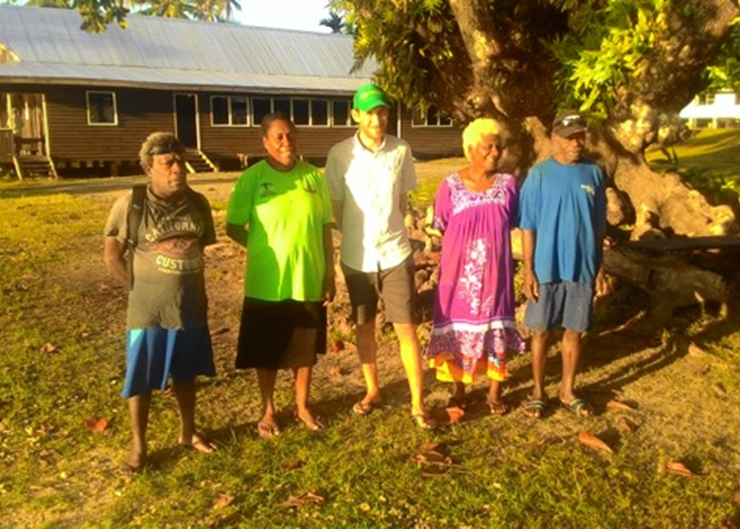
Vanuatu and New Zealand workshop participants: from left to right, Joachim Moleli, Evelyne Bulegih, Joe McCarter, Numaline Mahana, and Jimesan Sanhambath.
Outline of Events
Wednesday, February 21
The aim of day one was to understand the context of work in the Solomon Islands and Vanuatu. The meeting was opened by the chief of Hunda village and then formally begun by Vaghi. During the day, participants worked to compile lists of challenges around the maintenance of kastom and culture in their communities. The Vanuatu fieldworkers were able to provide input to these solutions with their practical experience. Discussions particularly focused on governance and how it was important to record knowledge on genealogies and leadership protocol; the participants felt that one of the key issues in the communities at the moment was a lack of legitimate leadership, combined with a lack of respect from youth. In the final part of the day, the Vanuatu fieldworkers went into greater depth about their work, including a discussion of some of the challenges of maintaining kastom and culture in Vanuatu.
Thursday, February 22
The aim of the second day was to pass on skills to assist with some of the challenges that were identified on the first day. The day began with a discussion of the “kastom economy” and the ways in which tradition and culture intersect with daily life in the village environment. For example, Chief Moleli discussed an initiative in his community, Tavendrua, to use traditional wealth items such as yams and pigs to pay teachers in the kastom school, while Mrs. Mahana discussed traditional marriage arrangements on Tanna Island. Participants then split into small groups to document the kastom economy in their communities. These groups focused on a variety of topics including traditional medicines, fishing techniques, and exchange items. In the afternoon, there was a practical session on the maintenance and recording of kastom and culture. Each of the fieldworkers gave a talk and held trainings on an area within their expertise: Mrs. Bulegih discussed the written recording and storage of kastom stories, Mrs. Mahana the written descriptions of weaving and woven products, Chief Moleli the recording of kastom stories, and Chief Sanhambath the use of handheld units to document sacred sites. The focus on all these presentations was to try to make sure that participants understood that technology should not be central for this work—that it is better to record things in a basic format (e.g., with pen and paper) and store it securely, to ensure that it is accessible to future generations.
Friday, February 23
The aim of the third day was to define next steps. Throughout the day, participants worked in small groups to define what practical steps could be taken to halt the erosion of kastom and culture. These were discussed in a closing plenary session. Topics included home-based recording with family members, consultation throughout the communities to decide which components of traditional knowledge and practice are at risk, and a cultural documentation network run through KIBCA. The group decided it was important to maintain linkages with the Vanuatu group, through Facebook and email, so that lessons could continue to be shared.
Saturday, February 24, and Sunday, February 25
On Saturday and Sunday, the Vanuatu group traveled to Imbu Rano field station on Kolombangara. During this trip they were able to observe KIBCA’s biodiversity conservation work in practice, as well as learn about threats to the area and the challenges that the rangers face on a daily basis.
Outputs and Outcomes
The workshop was lively, well attended, and able to produce the outputs that were intended. These included:
- Provision of a discussion forum and practical trainings around the maintenance of kastom and culture on Kolombangara
- Initiation of efforts on Kolombangara to maintain kastom and culture, at a household level and through the networks of KIBCA
- Creation of linkages and exchange between Vanuatu fieldworkers, biodiversity conservation rangers, and community members
- A draft newspaper article, which has been submitted for publication in the Solomon Star and Vanuatu Daily Post (find it in the full report)
We are confident that these outputs will lead to a range of outcomes. For one, this workshop gave the Solomon Island participants an introduction to the skills needed to monitor, record, and maintain cultural knowledge and practice, including the mapping of sacred sites around their home communities. More importantly, the discussions and activities of the workshop provided a forum for dialogue on the value of cultural knowledge and practice, which can sometimes be lost in the day-to-day focus on livelihoods and living. The participants agreed to some solid and measurable next steps, so we are confident that this workshop was a first step toward an ongoing network of cultural monitors and the maintenance of knowledge and practice on Kolombangara.
Over the longer term, we see these efforts as being a small but necessary contribution to the overall goal of maintaining the biocultural resilience of rural communities in the Solomon Islands. Both cultural and biological diversity are critical to the ongoing vitality of communities, and we believe that more of these kinds of activities and discussions are needed into the future.
Personal Reflection
From both a personal and a professional standpoint, it was a pleasure to be involved in organizing this meeting. On a personal level, it was a privilege to reconnect with the VCC group after several years, and it was exciting to begin to foster some dialogue around the importance of kastom and culture on Kolombangara. The VCC has been a regionally leading institution, and there would be much to be gained from further collaboration. From a professional standpoint, it is clear that the maintenance of knowledge and practice should form a key plank of ongoing efforts to support conservation work around the island. This work aligns well with other Kolombangara projects, including a push by KIBCA to seek national park status for the area above 400 m. The partnership with KIBCA was absolutely critical to the success of the meeting, and while there were challenges (for example, arranging logistics for Hunda, setting the agenda remotely, and the difficulties of scheduling across several different calendars), Vaghi and his team worked hard to make the meeting a success. I look forward to our working together to turn the discussions in the workshop into solid progress over the remainder of 2018 and 2019.
Find more details of the project in the original report.
